Content Marketing How To Find Blog Video & Podcast Topics
Are you looking for a new and effective way to attract and engage new audiences?
I don't think anyone would say "No" to that.
Well, starting a podcast is likely to be an answer for you!
But how to find your perfect podcast topic and format?
Here are a few podcast ideas for you to explore.
But first...
Contents
Why Podcasting and Why Now?
The Most Popular Podcasting Categories
What Should I Make My Podcast About?
What Format Should My Podcast Take? (6 types)
How Do I Choose a Podcast Topic? (9 steps)
Take Action!
Conclusion
Why Podcasting and Why Now?
Podcasting is not a new concept, of course, but 2020 gave a huge boost to the global podcasting industry.
Podcast statistics from Edison Research claim that in 2020, for the first time, more than 100 million Americans listen to at least one podcast each month.
When it comes to regular podcast listening, the numbers are growing slowly but steadily, gaining ~5%-6% every year.
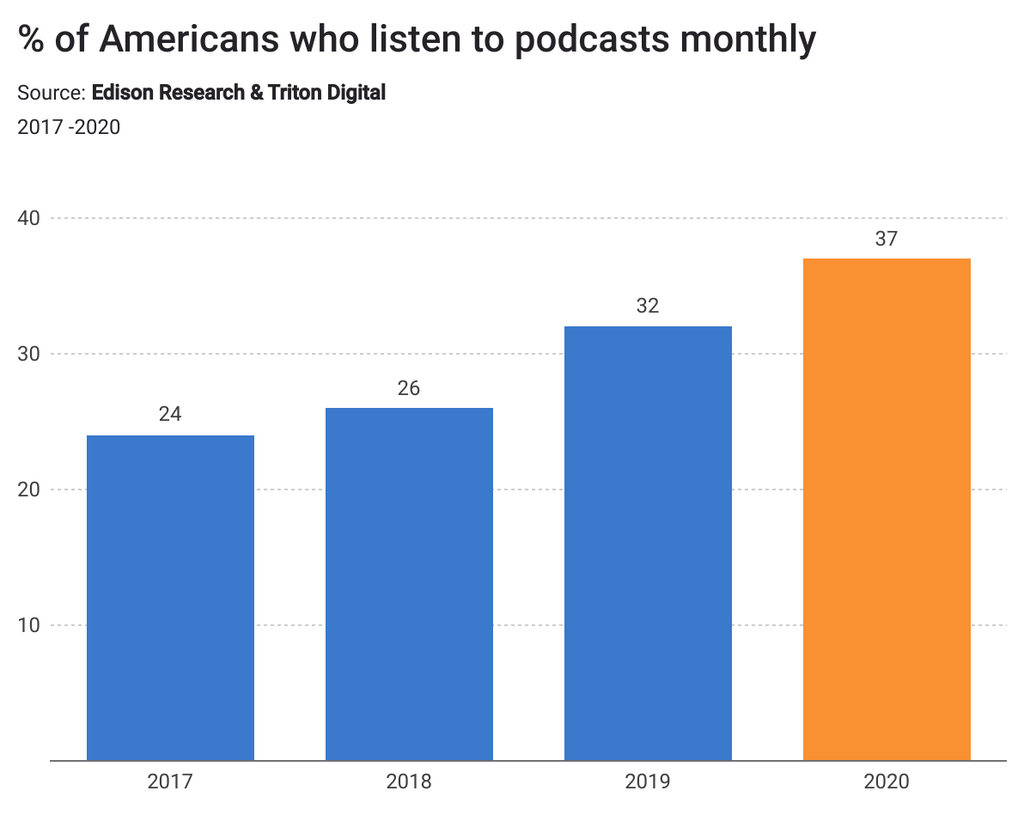
While loyal podcast listeners are slowly growing in numbers, the amount of content they tend to consume more than doubled in 2020.
What's more, according to Spotify, 2020 was a year of discovery for podcasts with more and more young people turning to podcast listening for the first time.
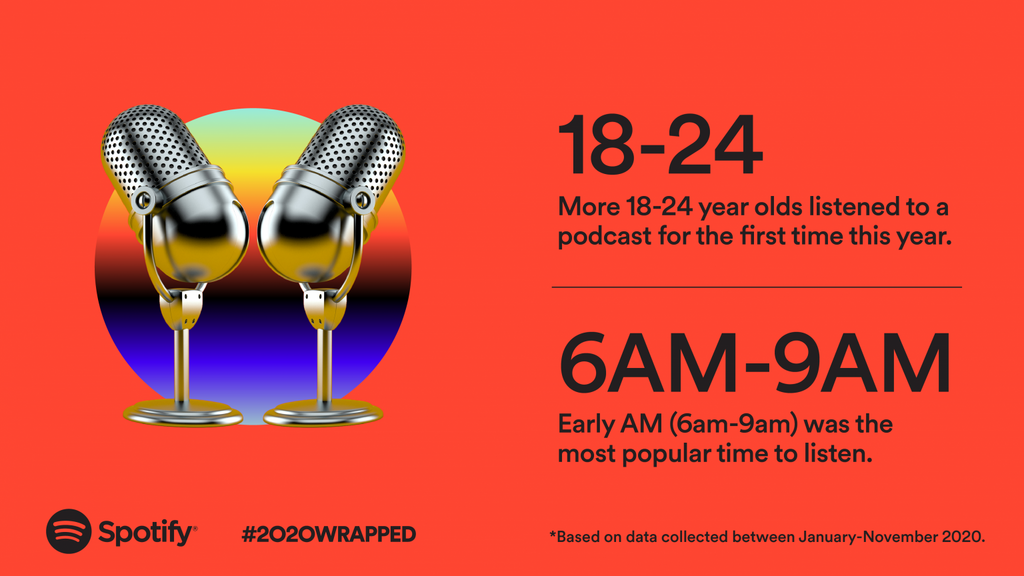
That's the kind of busy demographic that's not easy to engage, so it means a huge opportunity for brands and content publishers.
And that's something Edison Research confirms, claiming that more than 10 million of Americans became familiar with the word "podcasting" in 2020, and now 75% of the country's population know and understand the concept.
To sum up the stats above:
- Podcast consumption has been growing steadily over the years
- In 2020 lots of people - especially young people - discovered and started listening to podcasts for the first time
- After 2020 pandemic the amount of podcast content consumption more than doubled in the United States
All in all, starting a podcast looks like a great way to get found by a new audience and build brand loyalty.
The Most Popular Podcasting Categories
Not all sources agree on this but they are pretty close. According to the Spotify study above, the most popular podcasting categories among their users are:
- Society & Culture
- Comedy
- Lifestyle & Health
- Arts & Entertainment
- Education
During the pandemic, there were a few more trending categories which, while not having reached the top status, have seen an exponential growth.
These trending categories include:
- Nostalgia-themed podcasts
- Work-from-home podcasts
- Wellness podcasts
Statista presents slightly different rankings, putting comedy #1 and news #2 in popularity:
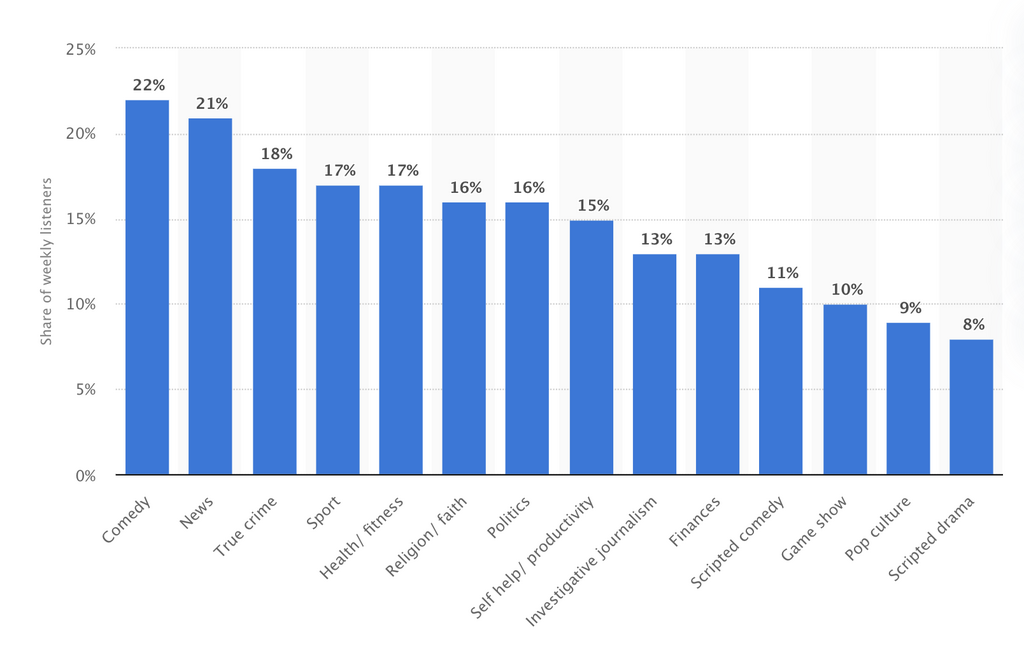
As I come from a digital marketing background, a few marketing-driven takeaways from this data are:
Comedy
Both sources agree that comedy is a very popular category which means starting a comedy podcast is almost always a good idea, in terms of building a popular podcast.
Yet, it does have a few huge challenges:
- Your brand will likely need to hire outside talent (or talents) as you can hardly "learn" to become a comedian unless you have a talent and some experience in making people laugh.
- For business-driven podcasts, comedy can also be a risky category as it's not always easy to make some people smile without offending others. Few brands should want to take those risks.
News
The news is very flexible: You can align it with your niche without being too limited in what you can report on.
From years of blogging, I also know that news-based content channels work best at accumulating loyal subscribers.
People are always willing to discover new ways to be in the know, and they often subscribe when they discover a solid source of niche news.
A distinctive challenge associated with news based podcasting is the need to maintain consistency.
You will need to report on news in a timely manner which will put you under a lot of stress.
Read on for more tips of how to find what's trending in the news, if you're set on creating this kind of podcast.
Health and Fitness
Health is the third most popular podcast topic according to Spotify and the fifth most popular category according to Statista.
This is a very niche category, meaning that it won't work for most brands outside of the Health and Wellness niche.
Otherwise it's a great topic, provided you have enough expertise.
Plus, ever since the recent pandemic and increased interest in public health, this has been a trending category globally.
Education
Finally, education is another category that may work for most brands. Podcasting is increasingly being used for self-education, so demand is growing there.
Like news, education can be applied to just about any niche. Creating high-quality how-to content has historically been a great way to build trust and establish your brand as a knowledge hub.
No wonder, according to the statistics, more and more brands are planning to invest in educational content, including videos and podcasts.
Repackaging your how-to content into a podcast may be a good idea, provided you have come up with an original format.
A great example of an educational podcast that keeps you listening episode after episode is Stuff You Should Know that tries and finds answers to most popular questions.
This is one of those podcasts you wish you had started!
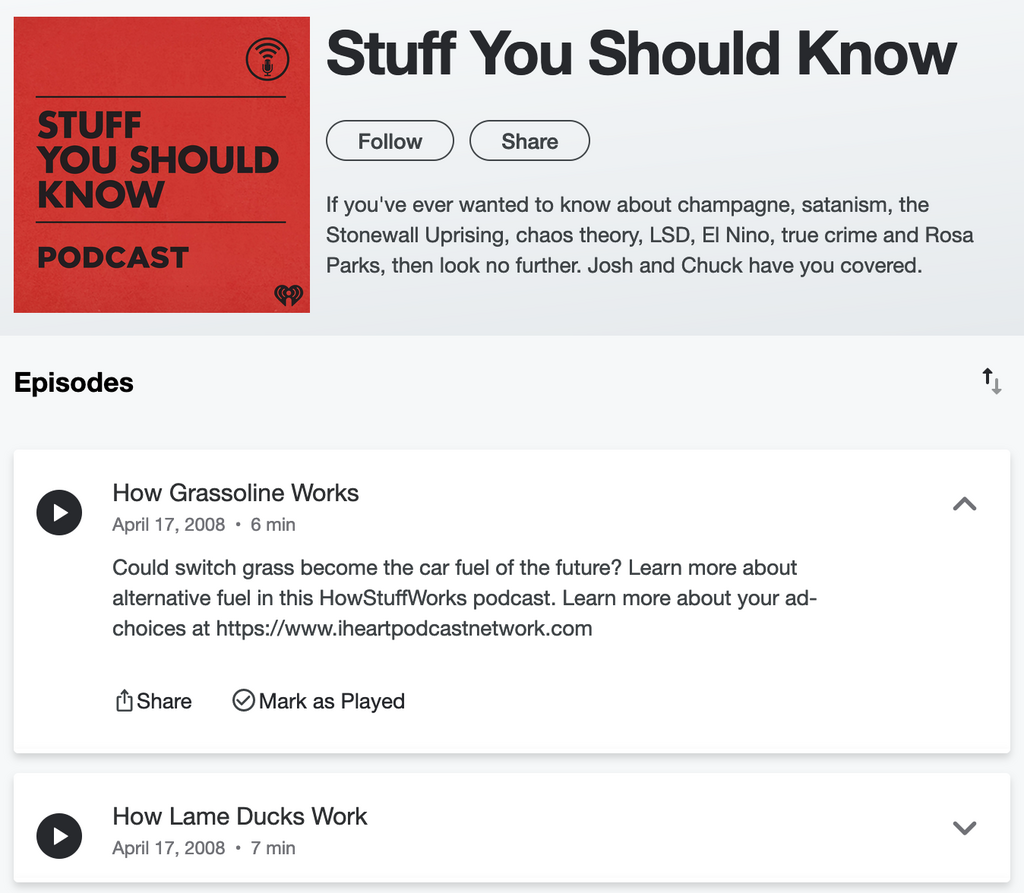
The education category gives you a lot of flexibility as to covering currently trending topics, including:
- Working from home
- Productivity
- Self-help
What Should I Make My Podcast About?
Before you start creating a master list of topics you want to cover, you need to figure out what your podcast is going to be about.
This decision may take some time, so don't rush it. You want to find a topic that would make you look forward to making each new episode. In other words, you need a topic you can feel excited about.
Taking pleasure in content you are producing is paramount to achieving success, so that should come first. From there:
- Think about the topics that align with your industry
- Think about what interests you and your listeners (based on your prior content marketing experience in the niche)
Additionally, when selecting a primary topic for just about anything I always try to look at where my own unique set of skills, interests, hobbies and expertise overlap with the industry I am creating the strategy for.
To help you with brainstorming, try BuzzSumo's Topic Explorer which allows you to get more suggested podcast topic ideas to spark inspiration. Just type your keyword there and BuzzSumo will suggest:
- Related keywords that have already been searched
- Content ideas that have already been written about
For example, if I wanted to create a podcast around productivity, I might choose to record an episode on:
- Time management
- Productivity hacks
- Procrastination
- Productivity software
And so on...
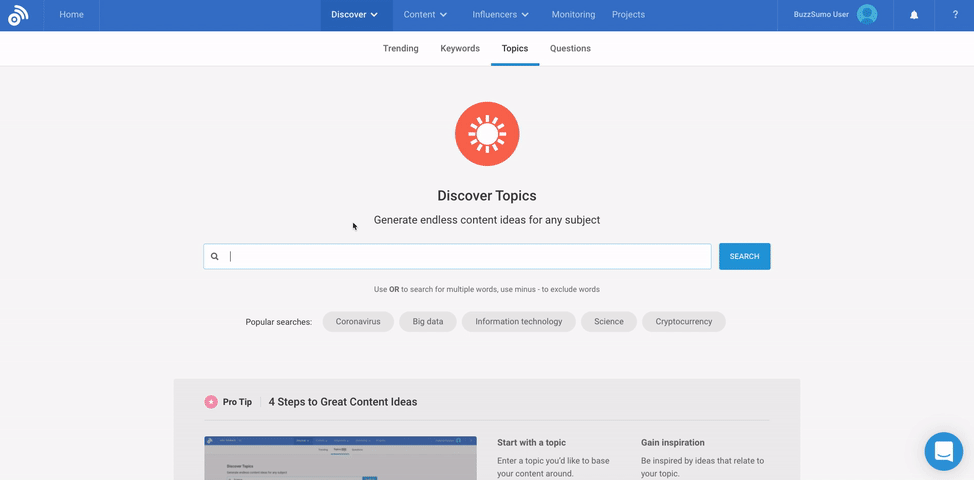
What Format Should My Podcast Take?
While finding what your podcast is going to be about is step #1, coming up with your own original format is also important as this will help you stand out in the crowd of other podcasters and define your marketing strategy.
Wistia identifies four main podcast formats:
1. Narrative-style podcast
These podcasts work like audiobooks broken into episodes. They tell stories of people, buildings, nations, etc.
Radiolab is one of the best examples of this podcast format.
As a subtype of this format is also a storytelling podcast which tells a fictional story with each new episode.
2. Solo podcast (commentary)
Solo podcasting relies on the personal branding of the host, as well as on their unique perspectives.
Dan Carlin's Hardcore History is on of the prime example of this type.
3. Co-hosted podcast
This format is similar to a solo podcast, but involves two or more niche experts sharing their perspectives on current news, trends or events.
Salesforce has a great co-hosted podcast called Marketing Cloudcast.
4. 1:1 interview podcast
The difference between a co-hosted show and an interview is that the latter focuses more on the guest, their personal story, and perspectives. The Tim Ferriss Show is a great example here.
Interviewing is a great way to build connections with niche experts.
An interview podcast is probably the easiest in terms of content. You don't need as much research to create this type of content.
You do, however, need to up your outreach tactics to get interesting guests on a regular basis. Here you rely on third-party schedules which can be tricky.
I am using a handy tool called Appointfix to keep my own interview schedule under control.
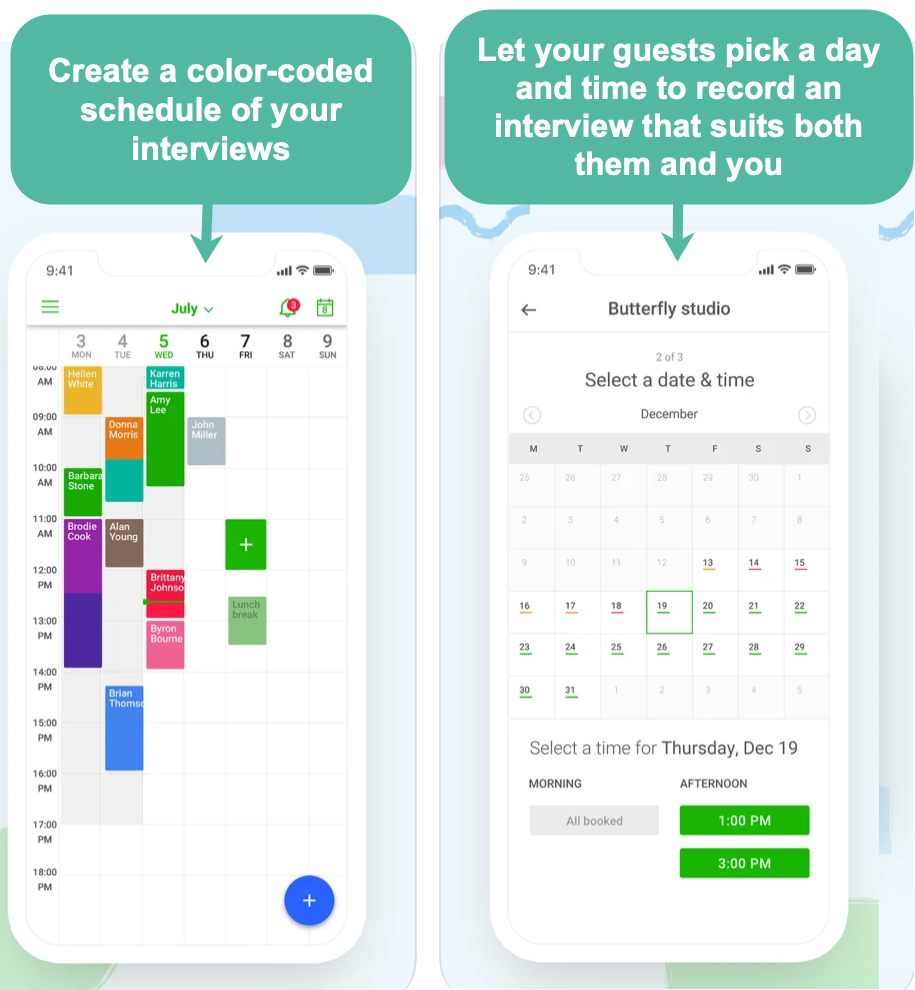
5. Panel discussion
Another increasingly popular format is apanel discussion,where there are several co-hosts or guests on a regular basis.
It has the same benefits and challenges as interviews do, only it is even more challenging to organize on a regular basis.
6. Repurposed content podcast
There's alsorepurposed content which is becoming more and more popular. If you have an active YouTube channel, there may be a chance to repurpose that existing content into an audio format. Even repurposing your Live video streams may be possible.
My favorite example of repurposed content is The TED Radio Hour which reuses videos as audio-only podcast episodes.
Obviously your own format can be a good mix of several formats. For example, a co-hosted format can include interviews with outside experts on a regular basis.
Before you decide on what your own show is going to be about and which format you will select, it is worth spending some time listening to other podcasts in your niche and outside of it.
How Do I Choose a Podcast Topic?
Coming up with podcast ideas on a weekly or monthly basis is going to be a challenge.
This puts podcast creators under a lot of stress.
Here are some tips and tools for creating a never-ending list of podcast topics:
1. Look at the questions your audience are asking
The BuzzSumo Question Analyzer collects discussions and Q&As from hundreds of thousands of forums and ecommerce sites, in relation to your podcast topic.
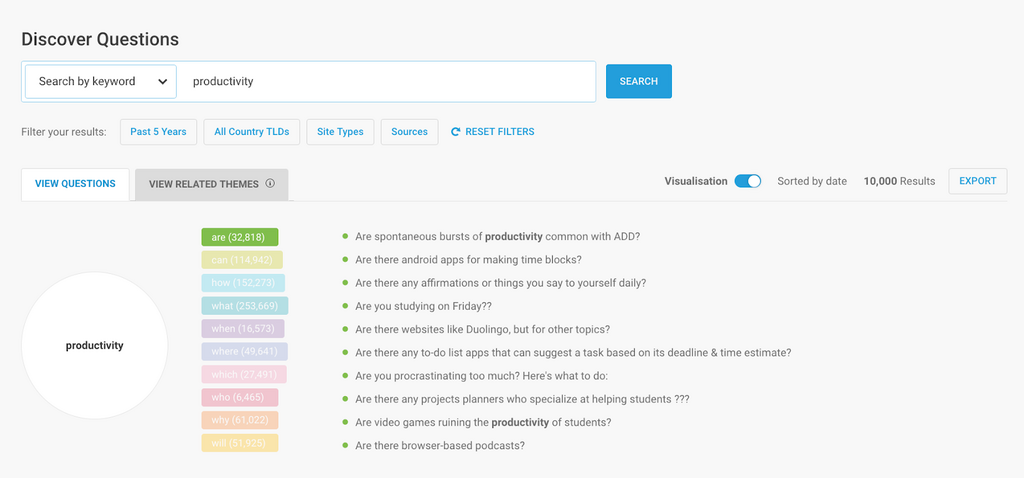
I like checking the "Related" tab to discover related topics and questions for my essential query. This really helps me look outside of the box, when it comes to podcast ideas!
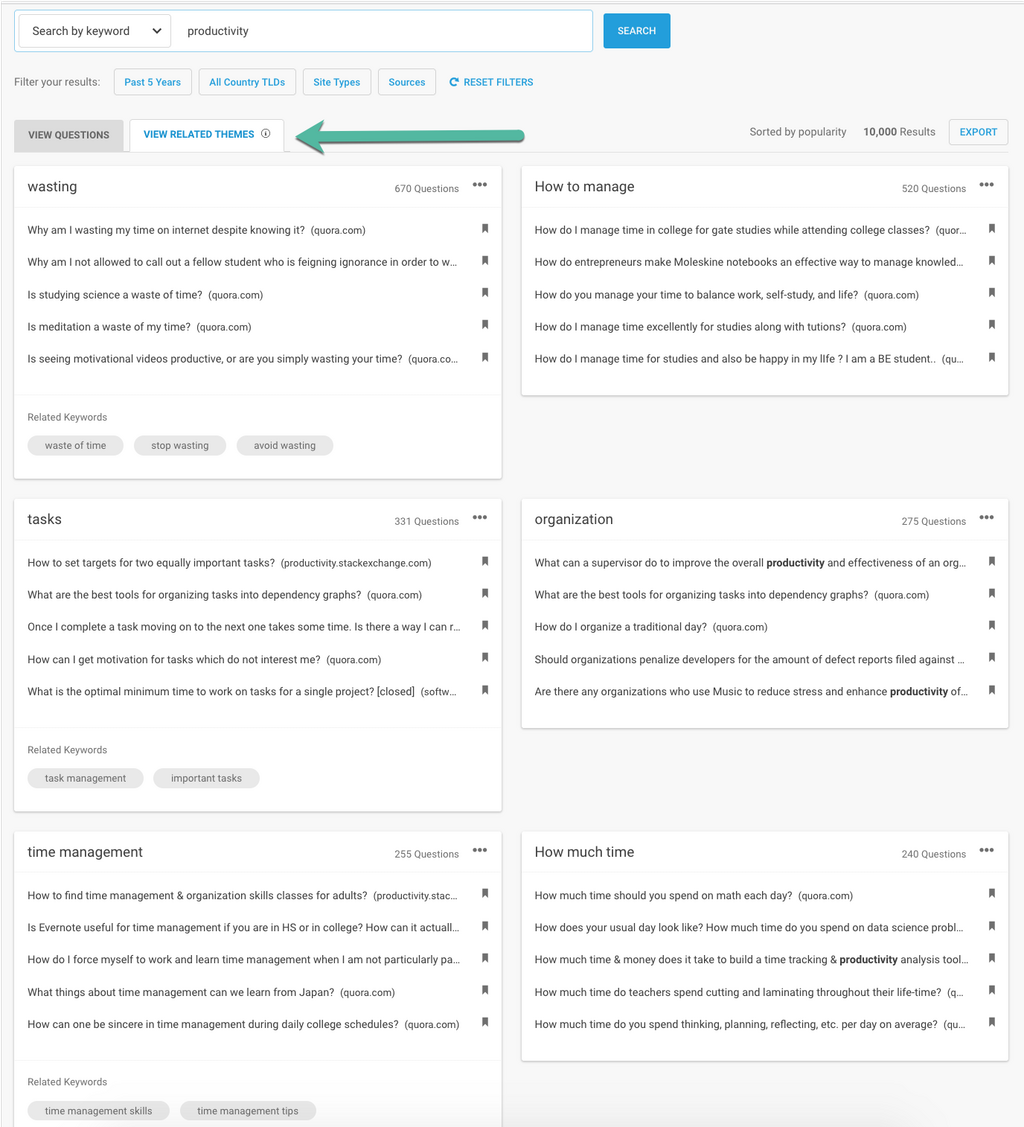
2. Browse Quora
While BuzzSumo's Question Analyzer includes Quora, I also suggest checking the site itself.
I like looking at the "Related questions" column as well as keeping track of active contributors there. It's a great way to discover more experts to invite to your future interview podcast.
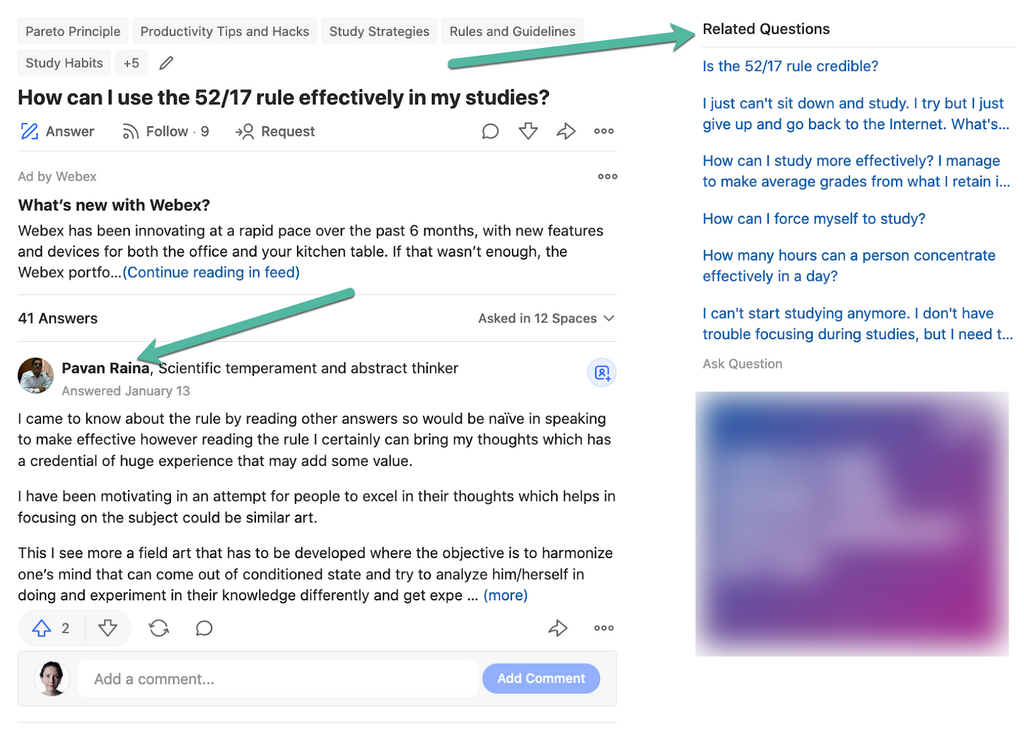
3. See what topics have already been created and searched
Use BuzzSumo's Keyword Tool lets you extend your core keyword as well as understand levels of demand for each one:
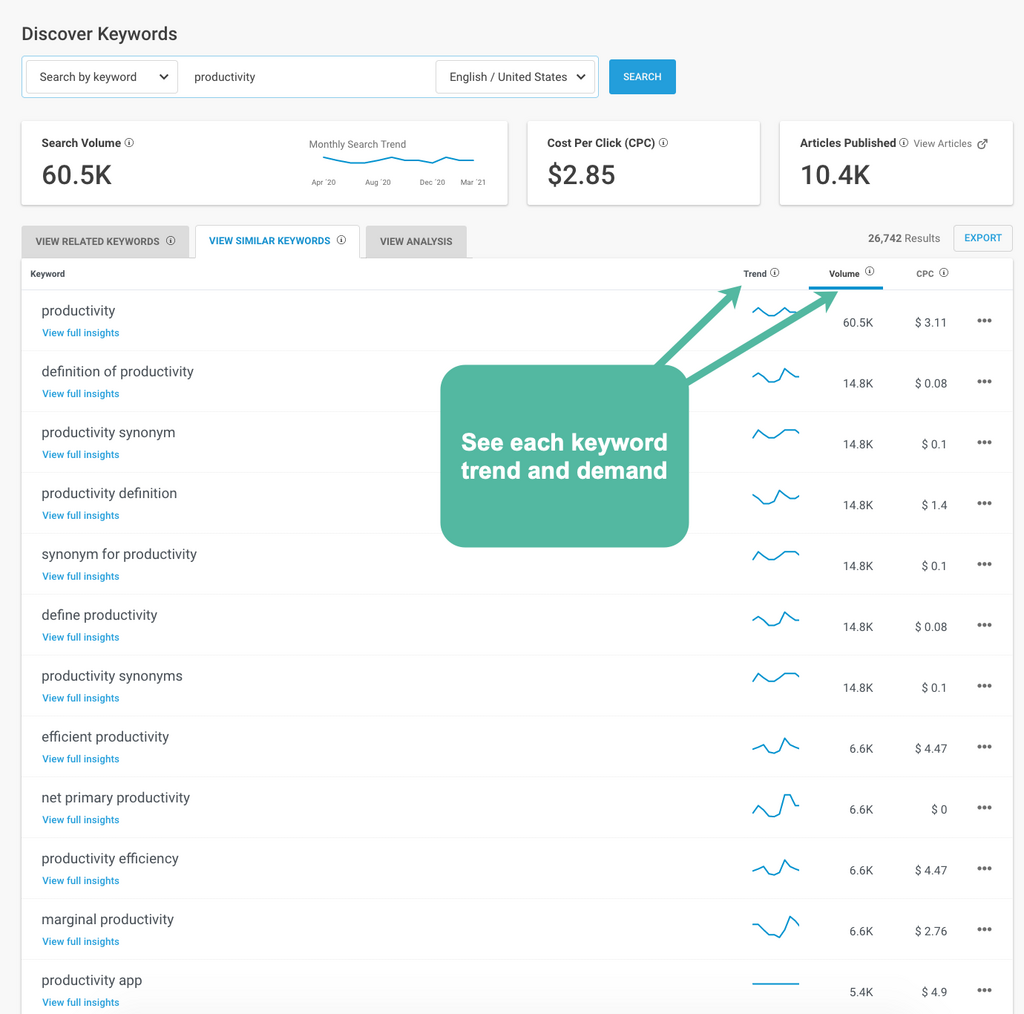
For each chosen keyword, you can also find podcast ideas, questions, and related terms by clicking the "View analysis" tab:
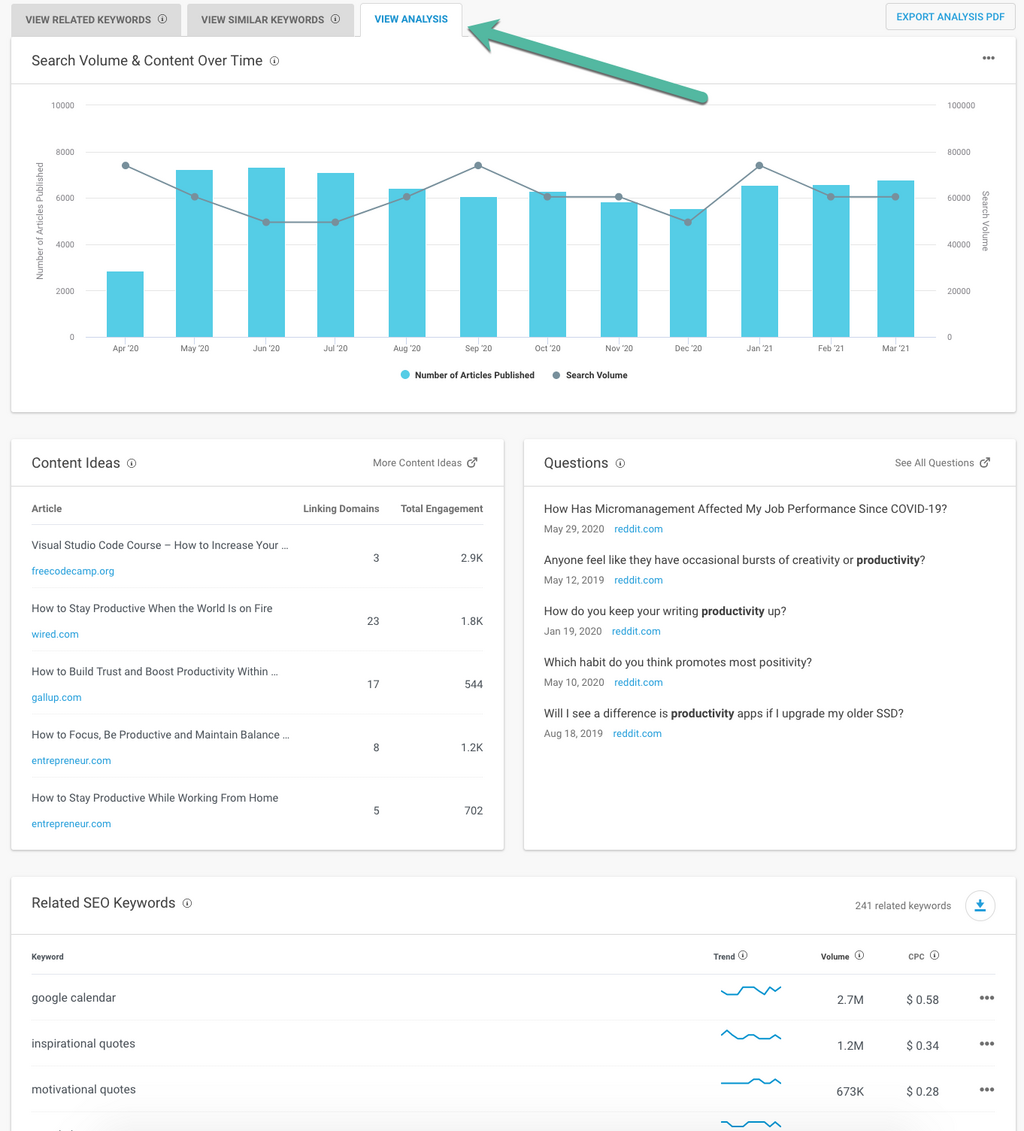
It is also a good idea to export your keyword list from BuzzSumo and group your keywords using this technique. I always find cool ideas when playing with my keyword lists in a spreadsheet.
For both strategic (higher-level) and tactical content brainstorming, I also use Text Optimizer, a tool that creates a mind-map of related and underlying concepts for your core query. For example, here are a few cool angles I picked up for [productivity]:
- Mornings
- Motivating
- Routines
- Mindset
- Recharge
- Shortcuts
- Delegating
- Willpower
- Multitasking
- Distractions
This took me a minute to pick, and all of these concepts sound like something I'd create a podcast about!
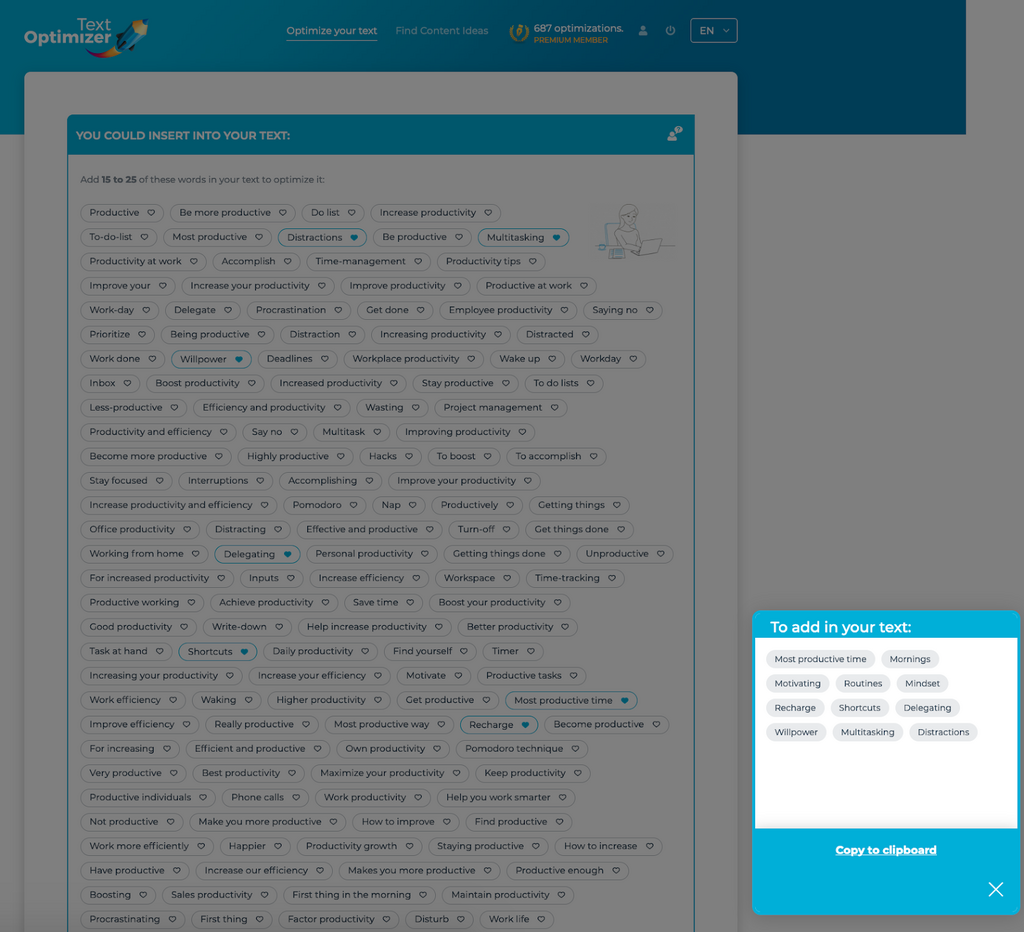
4. See what content is already driving engagement
Social engagement is a great indicator of content success, so looking at well-shared content in your niche is a great way to come up with engaging content ideas for yourself.
BuzzSumo's Content Analyzer is my go-to tool for analyzing content by its social media engagement. It offers a variety of sorting and filtering options allowing you to:
- Find most engaging content within a certain period of time (within a year, a month, a week, or within 5 years)
- See popular content in a certain country
- Filter content by format (videos, how-to content, infographics, etc.)
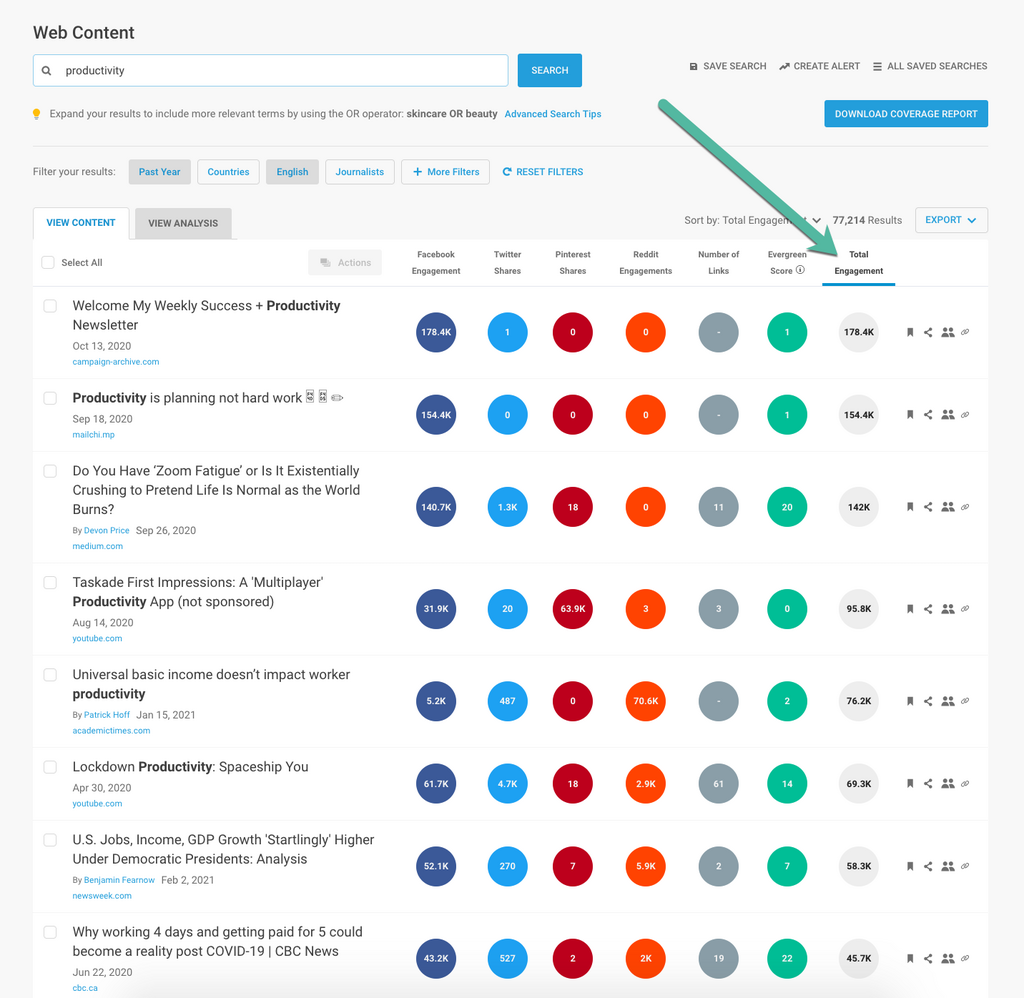
5. Learn from your own success
If you have been managing a blog or a YouTube channel, you have accumulated your own data no one else has access to. Using that data now will give you unique insights into what topics your audience likes most.
Using tools like Google Analytics and Finteza will help you identify your highest-traffic articles. You can limit the traffic data by source to identify content that drives clicks from organic search or social media. I like Finteza more in this respect because it allows you to slice and overlay reports easily without the need to take any special training.
Here's an example of Finteza report showing which articles are driving the most clicks from Twitter, for example:
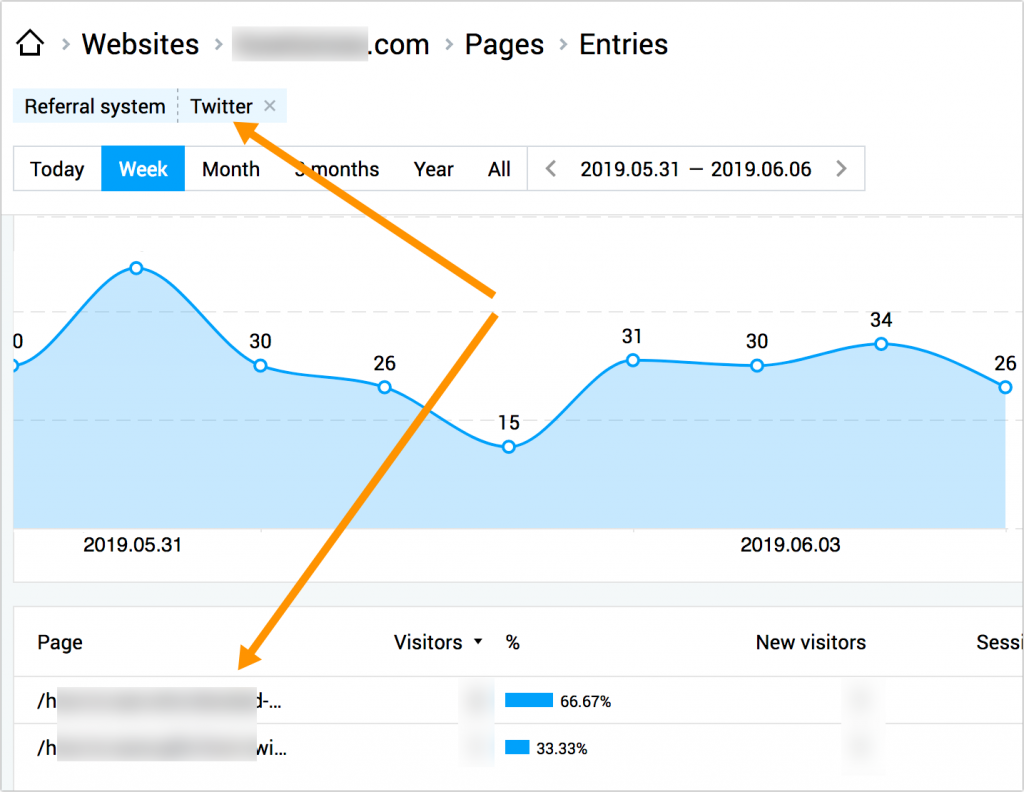
To generate this report in Finteza all you need to do is to select Twitter as your traffic source and proceed to the list of your top landing pages. The latter will be automatically filtered by the selected traffic source (i.e. Twitter in this case).
If you have an active YouTube channel, use YouTube analytics to identify your most engaging and viewed videos. To do that, login to your Youtube Studio, go to Analytics and there check the "Reach" tab of each individual video:
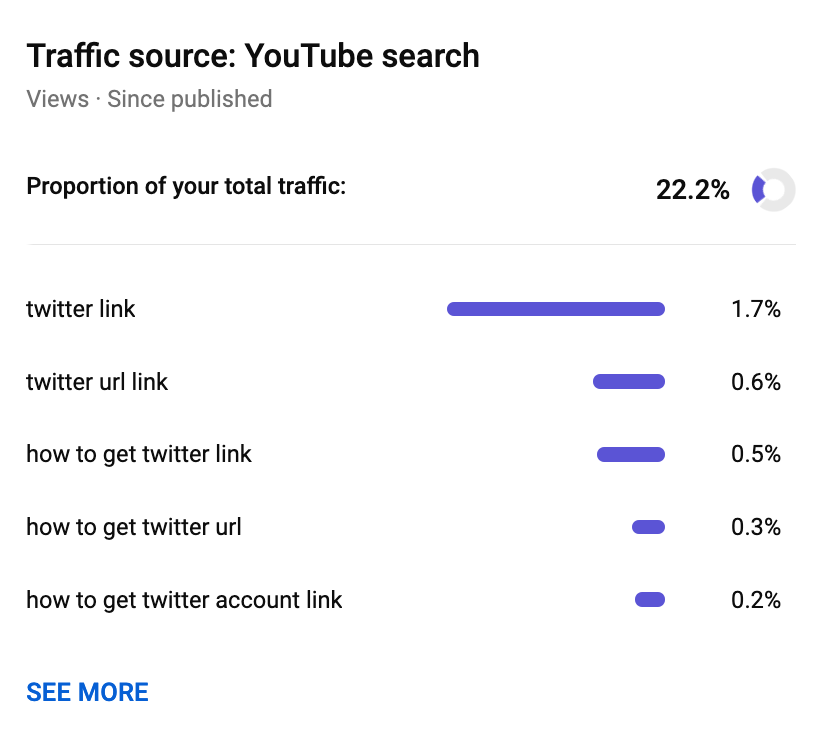
Clicking "More" will offer you a great insight into what type of engagement (views, view duration, etc.) each keyword is bringing to your video:
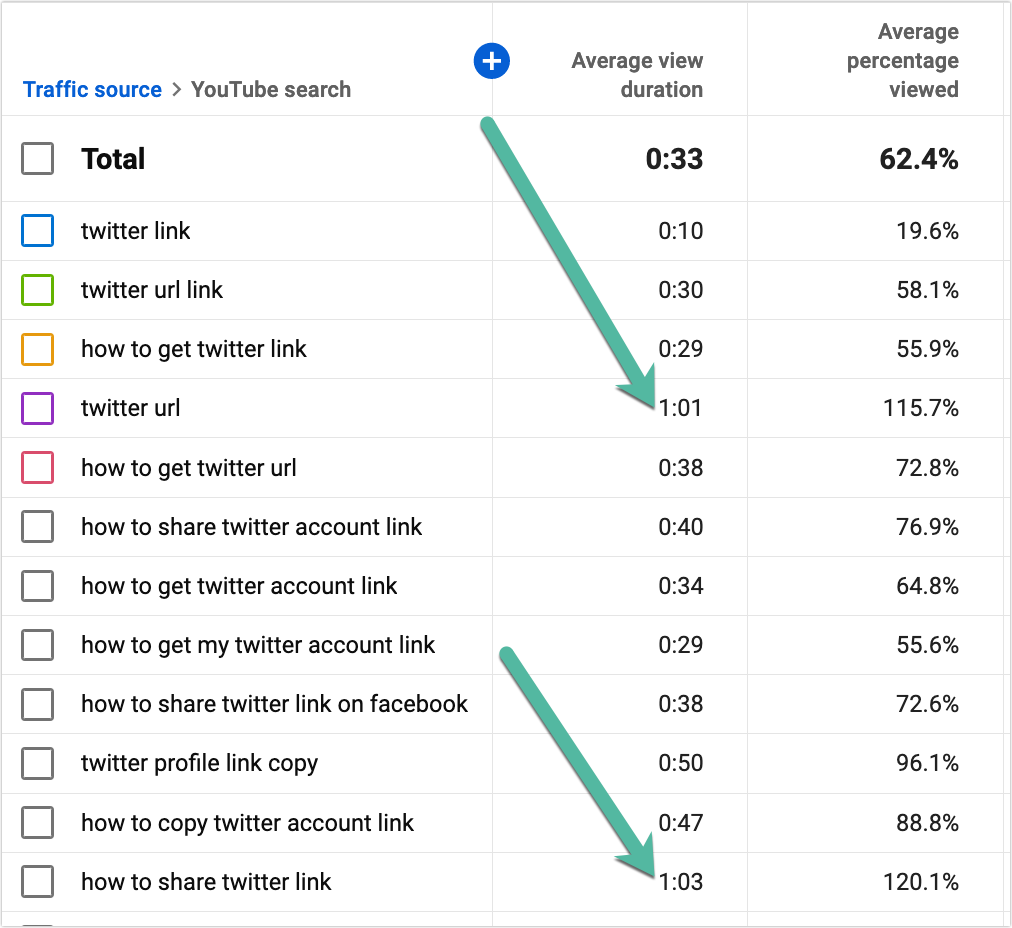
This report is handy as it can help you discover the most engaging keywords, to inspire a repurposed podcast idea.
6. Discover what's trending in the news
Use the BuzzSumo Trending tool to see what is being discussed in your country or globally, and whether there's an angle for you there.
By calculating the social engagement of a piece of content over a trending timeframe (between 1hr – 24hrs), BuzzSumo Trending can help you find topical, viral, or breaking news stories to feature in your podcast.
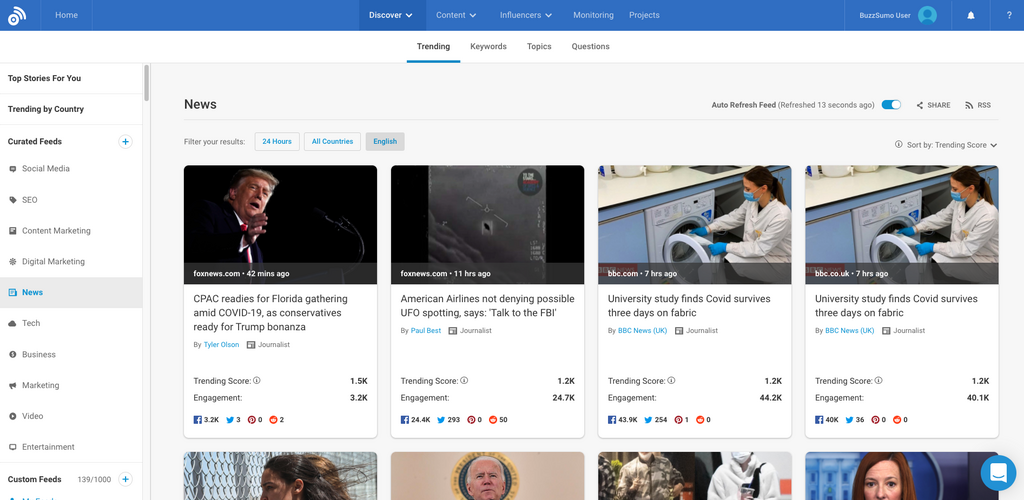
You can also create a separate feed for your core podcast topic to watch what's trending within your specific niche.
7. Search Twitter trends
Twitter is a great way to monitor currently hot trends. I like using Tweetdeck to always keep trending hashtags and trends in front of my eyes whenever I am there interacting with followers and friends:
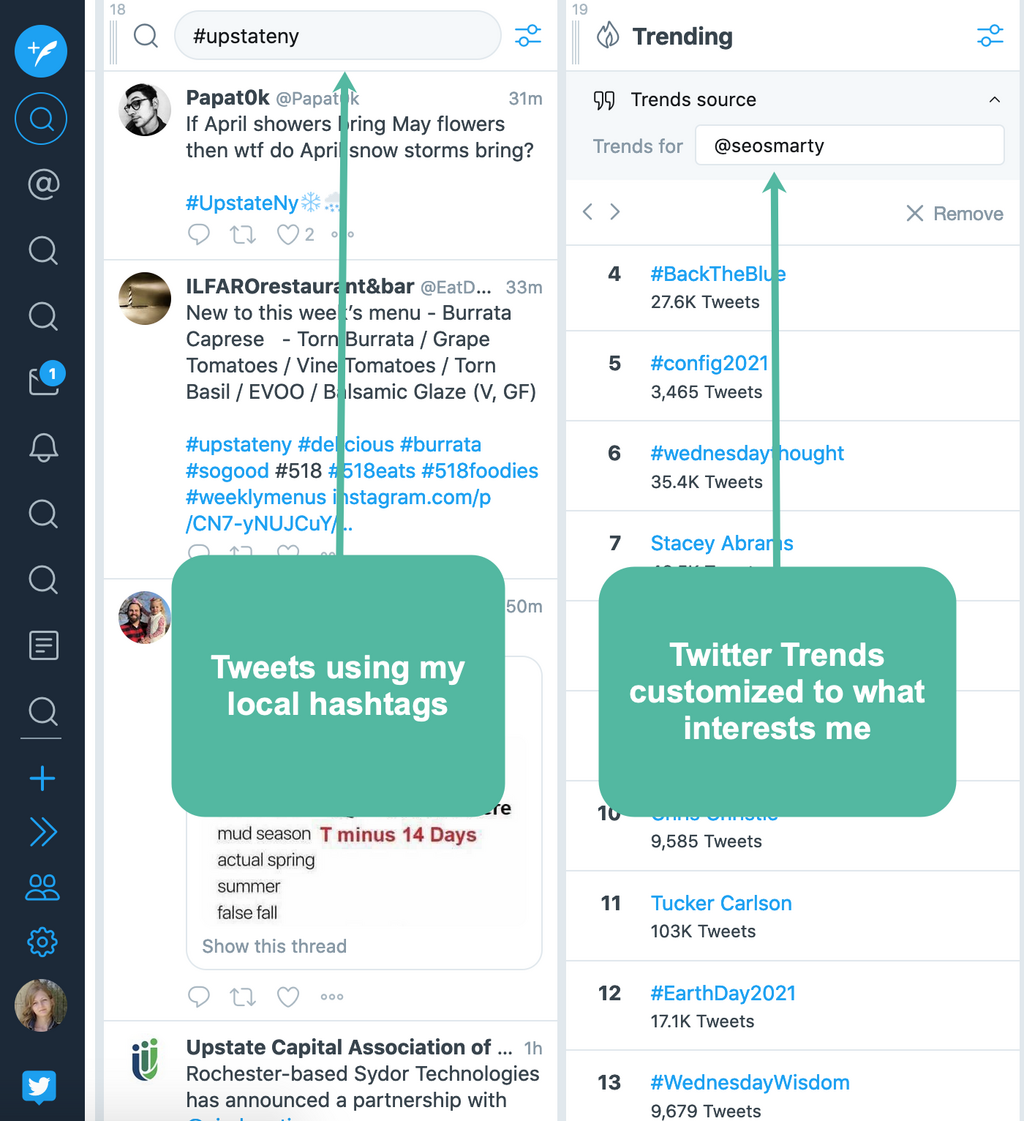
Twitter trends are customized to you and your tweeting patterns, so chances are you will see what is important to you there. To add a trending column, click + icon in the left column and select "Trending":
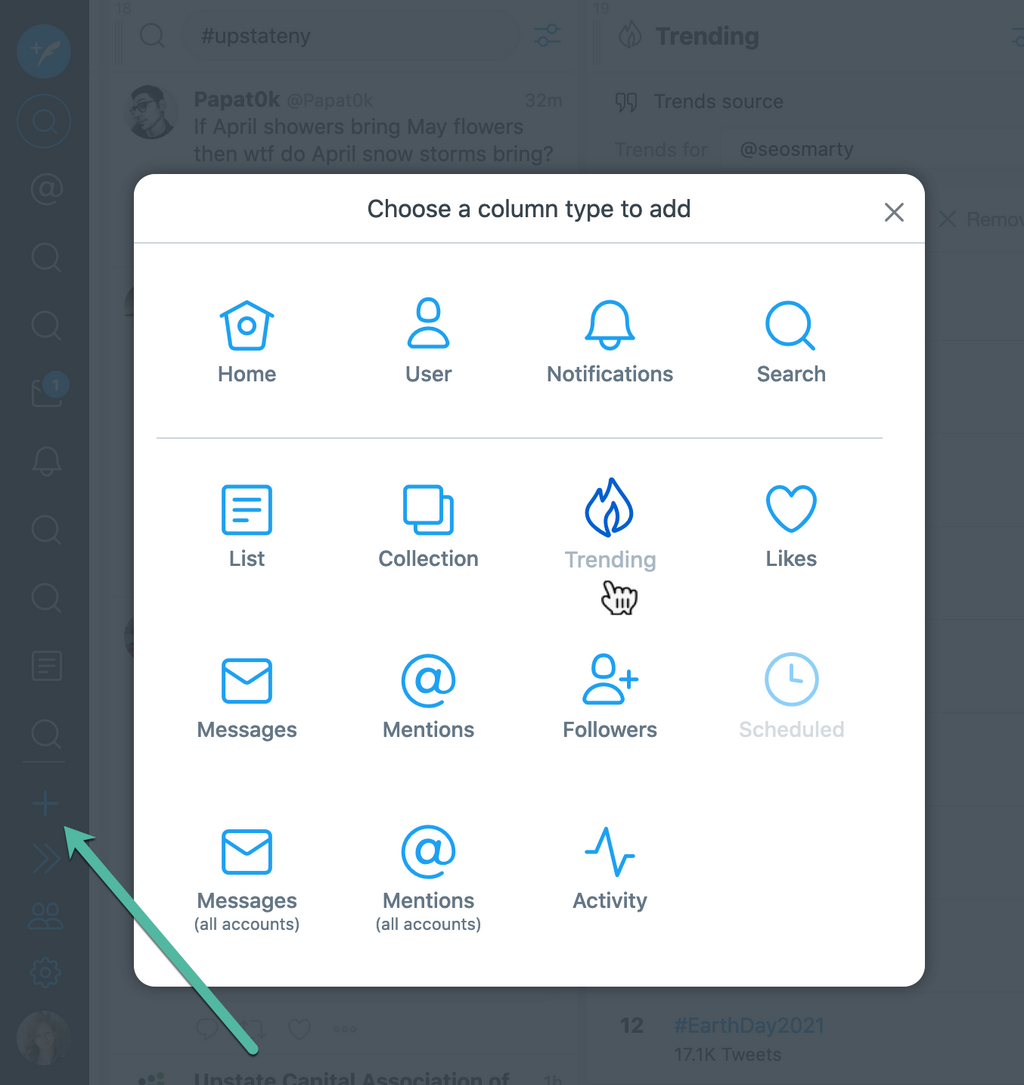
8. Explore Google Trends
When you feel stuck, check Google Trends for ideas. My favorite section there is an often-neglected "Related queries" box that lists trending terms with the biggest increase in search frequency since the last time period:
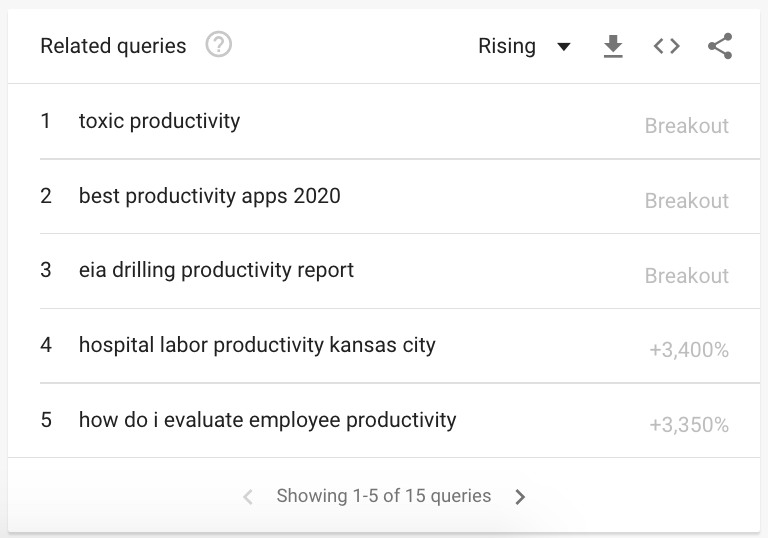
Queries labeled "Breakout" had a huge increase. Those also tend to be new, i.e. they had few (if any) prior searches.
Take Action!
Choosing your podcast topic takes time and lots of brainstorming but I didn't want to leave you here without any actionable steps to move forward.
Once you have your topic and a list of initial podcast ideas, here's how to take an action:
- Pick a plugin to host and market your podcast
- Here's my guide on anything which could apply to launching a podcast as well.
- There's also a pre-launch checklist I wrote for BuzzSumo that will turn useful here.
- Here's a list of (mostly free) podcast hosting platforms to choose from
Conclusion
Coming up with engaging content ideas is always tough as it seems that any topic has already been covered. To make it doable, set up face-to-face or virtual brainstorming meetings with your employees, co-workers or partners and run all the tools above together until you have a huge master spreadsheet of ideas to lean on for months to come.
To sum up, here are all the tools to use to brainstorm engaging podcast topics to attract new audience to your brand:
- UseBuzzSumo's Question Analyzerfind popular questions in your industry to answer in your podcast
- Use BuzzSumo's Topic Explorer and Keyword Tool to discover related and long-tail keywords
- See what content is already driving engagement usingBuzzSumo's Content Analyzer to see what people are sharing most
- Use your own analytics (Google Analytics, Finteza, Youtube Analytics) to distinguish content that drove most engagement to your site or Youtube channel
- Discover what's trending in the news usingBuzzSumo Trending, Twitter Trends, Google Trends and Reddit
Good luck!
If you want to test-drive any of the BuzzSumo tools featured in this article, get your free 30-day trial here – no credit card required!
Content Marketing How To Find Blog Video & Podcast Topics
Source: https://buzzsumo.com/blog/podcast-topics-ideas/
Posted by: jamescithys.blogspot.com

0 Response to "Content Marketing How To Find Blog Video & Podcast Topics"
Post a Comment